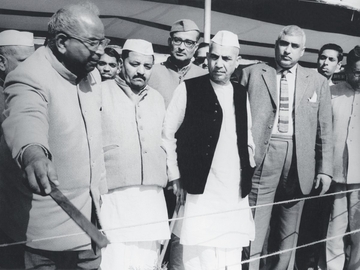A timely revision on the 1968 manifesto in keeping with novel political developments, this edition boasted thirty-five aims and objectives covering a gamut of economic, social and political concerns. In addition to issues noted in the ’68 version, the party now took a clear stand on funding: under “No Truck with Capitalism” voters were assured that it would not accept any funding from big businesses for permits and licences. This was forcefully outlined to distinguish the party from Congress (R) which still boasted a social base of big landlords and industrialists. The party also forcefully reaffirmed the importance of the separation of powers, providing by law that no member of the judiciary be re-employed by the government after their retirement from the bench. A similar law would be promulgated for governors to ensure the independence of the judiciary and executive. Ownership of property was also the bedrock of democracy for the party, and it believed that everyone who owns property is entitled to reasonable compensation for it. This was highlighted in the light of forced land redistribution drives popularised by the Communists at the time, which Charan Singh was strictly against. They also called for a maximum land ceiling of 27.5 acre per adult worker. Continuing Charan Singh’s earlier zeal for the tenantry, a group he had always taken particular interest in, the party stood also for the replacement of tenancy with ownership, which would bring them into a direct relationship with the state rather than through parasitic middle-men. This period also marks the beginning of a significant shift in the BKD’s political skew regarding minority affairs. While the party had not previously endorsed reservations, this manifesto marks a watershed: there was no way out of the prevailing and abiding casteism of the day without active affirmative action. To this end, it endorsed the position of the Kalelkar Commission which had called for a 25% reservation for backward classes in Government Gazetted jobs.
The release of “Aims and Principles of the BKD”
Jan 1971
View Fullscreen / Download
| Attachment | Size |
|---|---|
| BKD Aims and Principles, 1971.pdf | 6.04 MB |


